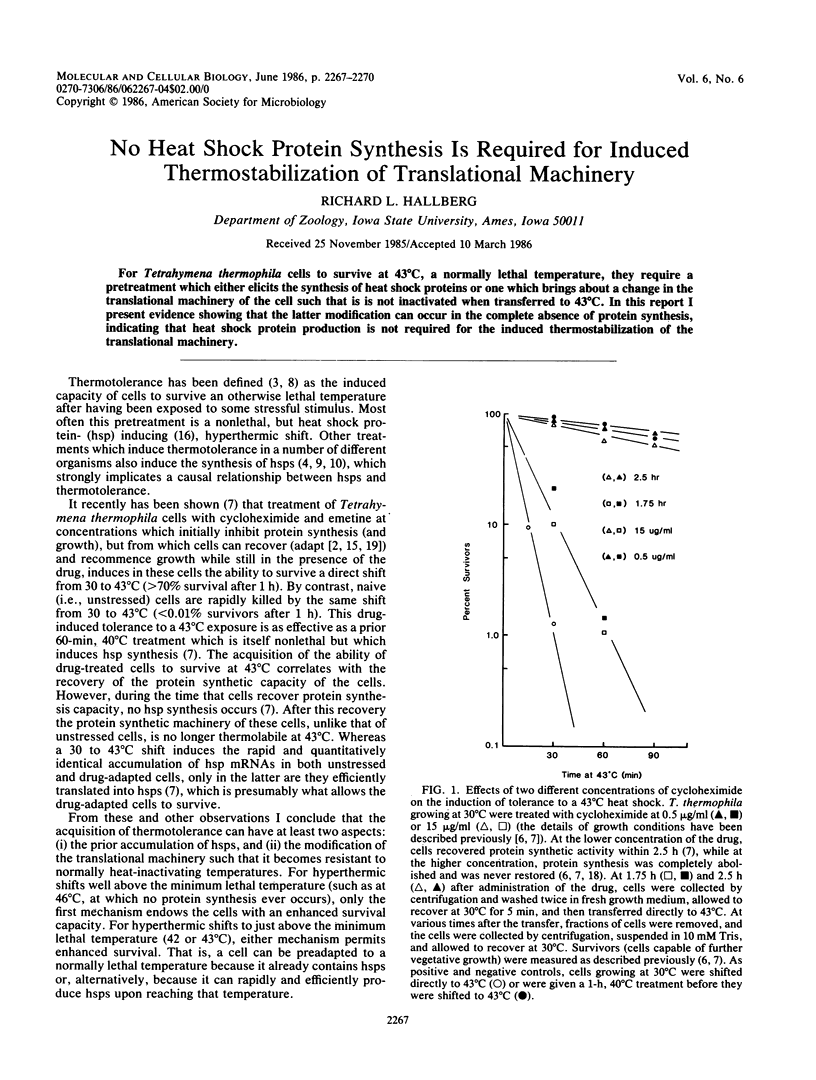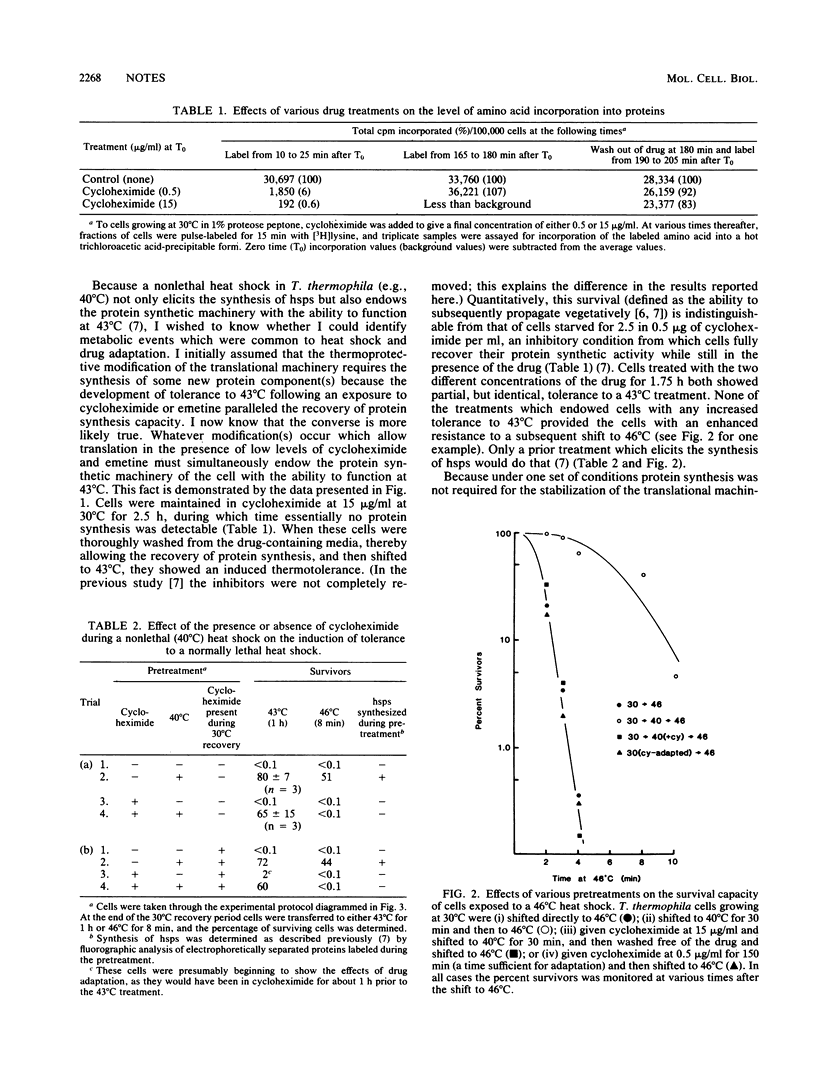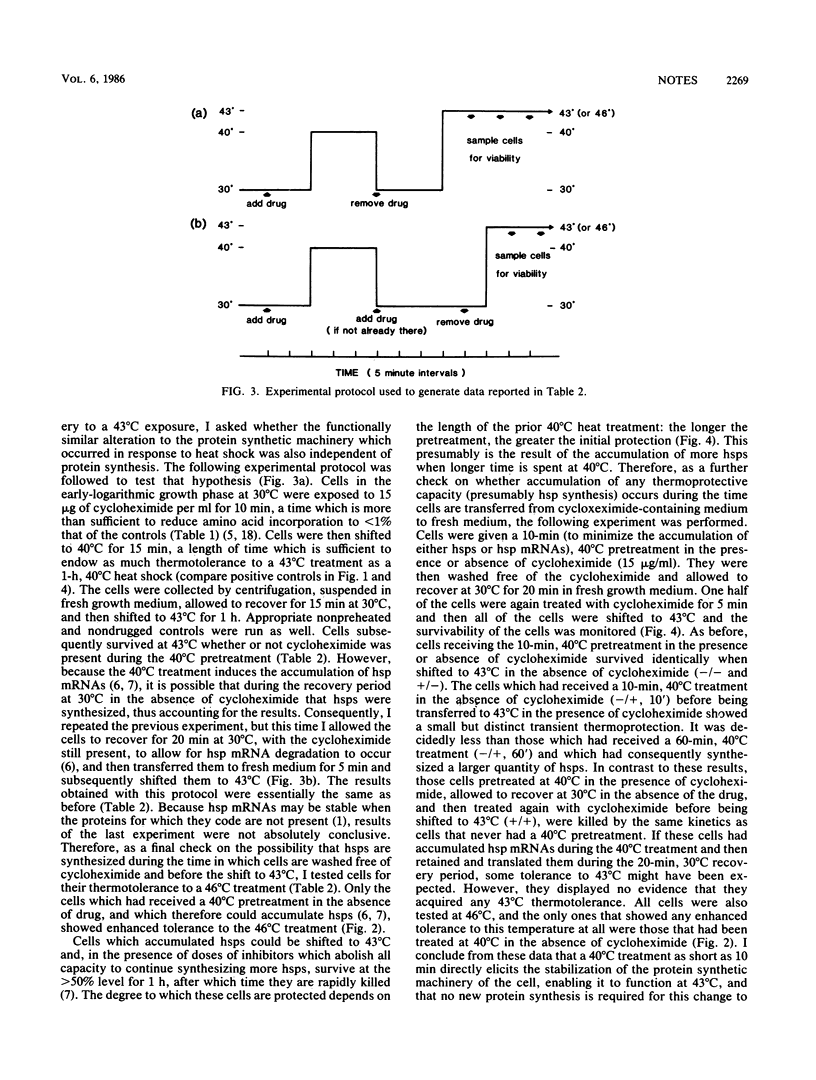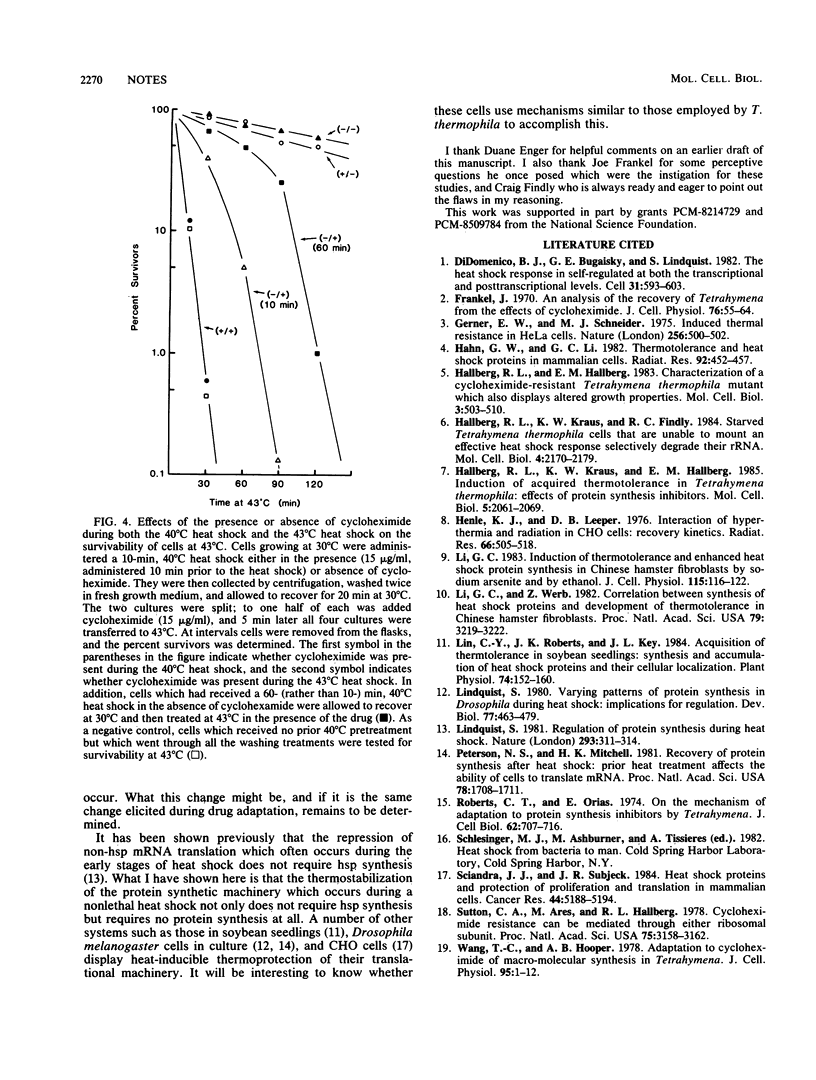Abstract
For Tetrahymena thermophila cells to survive at 43 degrees C, a normally lethal temperature, they require a pretreatment which either elicits the synthesis of heat shock proteins or one which brings about a change in the translational machinery of the cell such that is is not inactivated when transferred to 43 degrees C. In this report I present evidence showing that the latter modification can occur in the complete absence of protein synthesis, indicating that heat shock protein production is not required for the induced thermostabilization of the translational machinery.
Full text
PDF



Selected References
These references are in PubMed. This may not be the complete list of references from this article.
- DiDomenico B. J., Bugaisky G. E., Lindquist S. The heat shock response is self-regulated at both the transcriptional and posttranscriptional levels. Cell. 1982 Dec;31(3 Pt 2):593–603. doi: 10.1016/0092-8674(82)90315-4. [DOI] [PubMed] [Google Scholar]
- Frankel J. An analysis of the recovery of tetrahymena from effects of cycloheximide. J Cell Physiol. 1970 Aug;76(1):55–63. doi: 10.1002/jcp.1040760109. [DOI] [PubMed] [Google Scholar]
- Gerner E. W., Schneider M. J. Induced thermal resistance in HeLa cells. Nature. 1975 Aug 7;256(5517):500–502. doi: 10.1038/256500a0. [DOI] [PubMed] [Google Scholar]
- Hahn G. M., Li G. C. Thermotolerance and heat shock proteins in mammalian cells. Radiat Res. 1982 Dec;92(3):452–457. [PubMed] [Google Scholar]
- Hallberg R. L., Hallberg E. M. Characterization of a cycloheximide-resistant Tetrahymena thermophila mutant which also displays altered growth properties. Mol Cell Biol. 1983 Apr;3(4):503–510. doi: 10.1128/mcb.3.4.503. [DOI] [PMC free article] [PubMed] [Google Scholar]
- Hallberg R. L., Kraus K. W., Findly R. C. Starved Tetrahymena thermophila cells that are unable to mount an effective heat shock response selectively degrade their rRNA. Mol Cell Biol. 1984 Oct;4(10):2170–2179. doi: 10.1128/mcb.4.10.2170. [DOI] [PMC free article] [PubMed] [Google Scholar]
- Hallberg R. L., Kraus K. W., Hallberg E. M. Induction of acquired thermotolerance in Tetrahymena thermophila: effects of protein synthesis inhibitors. Mol Cell Biol. 1985 Aug;5(8):2061–2069. doi: 10.1128/mcb.5.8.2061. [DOI] [PMC free article] [PubMed] [Google Scholar]
- Henle K. J., Leeper D. B. Interaction of hyperthermia and radiation in CHO cells: recovery kinetics. Radiat Res. 1976 Jun;66(3):505–518. [PubMed] [Google Scholar]
- Li G. C. Induction of thermotolerance and enhanced heat shock protein synthesis in Chinese hamster fibroblasts by sodium arsenite and by ethanol. J Cell Physiol. 1983 May;115(2):116–122. doi: 10.1002/jcp.1041150203. [DOI] [PubMed] [Google Scholar]
- Li G. C., Werb Z. Correlation between synthesis of heat shock proteins and development of thermotolerance in Chinese hamster fibroblasts. Proc Natl Acad Sci U S A. 1982 May;79(10):3218–3222. doi: 10.1073/pnas.79.10.3218. [DOI] [PMC free article] [PubMed] [Google Scholar]
- Lin C. Y., Roberts J. K., Key J. L. Acquisition of Thermotolerance in Soybean Seedlings : Synthesis and Accumulation of Heat Shock Proteins and their Cellular Localization. Plant Physiol. 1984 Jan;74(1):152–160. doi: 10.1104/pp.74.1.152. [DOI] [PMC free article] [PubMed] [Google Scholar]
- Lindquist S. Regulation of protein synthesis during heat shock. Nature. 1981 Sep 24;293(5830):311–314. doi: 10.1038/293311a0. [DOI] [PubMed] [Google Scholar]
- Lindquist S. Varying patterns of protein synthesis in Drosophila during heat shock: implications for regulation. Dev Biol. 1980 Jun 15;77(2):463–479. doi: 10.1016/0012-1606(80)90488-1. [DOI] [PubMed] [Google Scholar]
- Petersen N. S., Mitchell H. K. Recovery of protein synthesis after heat shock: prior heat treatment affects the ability of cells to translate mRNA. Proc Natl Acad Sci U S A. 1981 Mar;78(3):1708–1711. doi: 10.1073/pnas.78.3.1708. [DOI] [PMC free article] [PubMed] [Google Scholar]
- Roberts C. T., Jr, Orias E. On the mechanism of adaptation to protein synthesis inhibitors by Tetrahymena. Facilitation, cross adaptation, and resensitization. J Cell Biol. 1974 Sep;62(3):707–716. doi: 10.1083/jcb.62.3.707. [DOI] [PMC free article] [PubMed] [Google Scholar]
- Sciandra J. J., Subjeck J. R. Heat shock proteins and protection of proliferation and translation in mammalian cells. Cancer Res. 1984 Nov;44(11):5188–5194. [PubMed] [Google Scholar]
- Sutton C. A., Ares M., Jr, Hallberg R. L. Cycloheximide resistance can be mediated through either ribosomal subunit. Proc Natl Acad Sci U S A. 1978 Jul;75(7):3158–3162. doi: 10.1073/pnas.75.7.3158. [DOI] [PMC free article] [PubMed] [Google Scholar]
- Wang T. C., Hooper A. B. Adaptation to cycloheximide of macromolecular synthesis in Tetrahymena. J Cell Physiol. 1978 Apr;95(1):1–11. doi: 10.1002/jcp.1040950102. [DOI] [PubMed] [Google Scholar]


